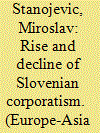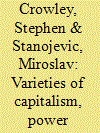| Srl | Item |
| 1 |
ID:
114174


|
|
|
|
|
| Publication |
2012.
|
| Summary/Abstract |
In the 1990s a regulative pattern that strongly mirrored the structure and basic functions of post-war European corporatism was formed and stabilised in Slovenia. The system enabled the country's relatively fast and smooth inclusion in the European monetary system. However, its former rise and recent tendency towards disorganisation clearly overlap with the qualitatively different phases of Europeanisation. At first glance, this overlap supports the thesis that there has been a decline of corporatist pacts in the post-EMU period, suggesting that the decline is caused by the more or less successful internalisation of EMU demands and pressures during the accommodation process. In the Slovenian case, this interpretation is basically misleading. It is true that the decline of corporatism in Slovenia was connected with EMU pressures, but the primary source of its disorganisation lay in its specific micro-foundations.
|
|
|
|
|
|
|
|
|
|
|
|
|
|
|
|
| 2 |
ID:
105894


|
|
|
|
|
| Publication |
2011.
|
| Summary/Abstract |
Although Slovenia is a small, relatively new nation-state, it has been justifiably called "neocorporatist" and a "coordinated market economy," making it unique among postcommunist societies, including ten new EU member states. The authors explore how it became so, and in the process shed light on the debate between varieties of capitalism (VoC) and power resources theories about how coordinated or neocorporatist economies emerge. Although several of the elements predicted by the varieties of capitalism perspective were present in Slovenia, others were not. The authors also find that a significant mobilization by organized labor at a crucial point played an essential role, and overall find that power resources theory has greater explanatory power in this case. However, in turning from explaining how the Slovenian model was formed to why it was so unique among postcommunist cases, they find that specific historical legacies were critical, particularly those from the distinct Yugoslav form of communism.
|
|
|
|
|
|
|
|
|
|
|
|
|
|
|
|